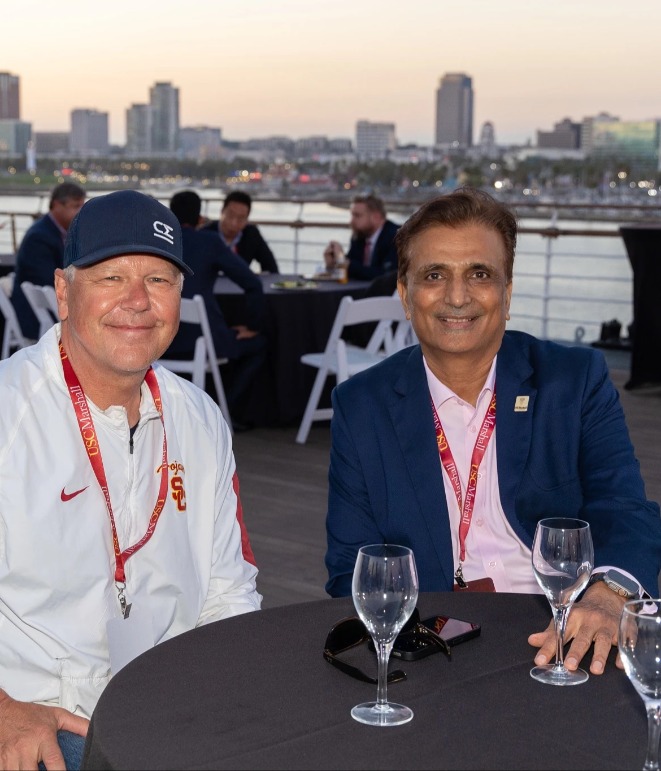
Interview: Marco Aponte-Moreno in KCBS
Aponte-Moreno discusses the tense situation between the United States and Venezuela and the prospect of a possible regime change in the South American country.
12th Annual Global Supply Chain Summit Gathers Industry and Academic Leaders
12th Annual Global Supply Chain Summit Gathers Industry and Academic Leaders
Speakers and attendees tackled the future of the supply chain, from sustainability to the integration of artificial intelligence at the Global Supply Chain Excellence Summit.

Randall R. Kendrick and Nick Vyas at the Global Supply Chain Summit.
[USC Photo/Tom Queally]
The Global Supply Chain Excellence Summit took place on August 15–16, in which experts and attendees gathered to tackle the current and emerging obstacles facing the world’s supply chain.
Over 630 industry leaders, faculty from around the country, as well as students and alumni from the MS Global Supply Chain Management (MSGSCM) program convened in the Marriott Long Beach Downtown’s Bixby Ballroom for the 12th annual conference hosted by the USC Marshall’s Randall R. Kendrick Global Supply Chain Institute. Attendees included Long Beach Mayor Rex Richardson, Ambassador and Consul General Carlos Gonzalez Gutierrez, business delegations from Asia, Europe, and Latin America, and 13 high school students from Los Angeles’ inner city.
This year’s theme was “Supply Chain 2030: Exploring the AI-Driven, Resilient, Agile, and Sustainable Frontier.” Panels, fireside chats, and speeches focused on the ongoing challenges brought on by the pandemic, environmental threats, and the emergence of artificial intelligence (AI).
In his remarks, Marshall Dean Geoff Garrett highlighted the significance of understanding and researching the supply chain from multiple lenses, including geopolitics, manufacturing, technology, and sustainability. He emphasized the importance of the institute and the summit in providing thought leadership in such critical areas.
“The fact that this supply chain summit has grown so much in the past 12 years is not only a testament to the wonderful quality of the people involved in the institute but also to the brilliant timing of its creation as the world came to realize the global impact of supply chain efficiency, resiliency, and sustainability,” Garrett said.
Gene Seroka, executive director of the Port of Los Angeles and chairman of the executive board for the Kendrick Institute, emphasized the outsized role the institute plays in connecting USC with the supply chain community. For Seroka, the program tackles three key priorities: educating its students, connecting with business and industry, and facilitating applied student research into the field.
Through these approaches, Seroka says, Marshall’s contributions and research can push the supply chain forward, particularly amid rapidly evolving technology.
“We need investment across all areas, and academia is at the center of that. We need these bright minds to help us test, process, and take back the information for engineers and scientists to evaluate so we can speed up this technology,” Seroka said of AI, while reiterating that the application of technology cannot be at the expense of the labor force.
Nick Vyas, founding director of the Kendrick Institute, struck an optimistic note, seeing rapid technological advancement as an opportunity to grow and the summit as a chance for experts and leaders to adapt to new trends. He believes that some of the most drastic shifts — such as the emergence of generative AI — can lead to the most innovative solutions.
“We stand at a pivotal crossroads as we look toward 2030,” Vyas said. “Geo-political shifts, technological advancements, sustainability imperatives, and the evolving dynamics of human capital are converging to disrupt the status quo that has defined supply chain practices for decades. We are not just observing these changes at this critical juncture — we are leading the charge.”
Vyas, is co-authoring a book on the supply chain network with Senior Vice Dean of Faculty and Academic Affairs Greys Sošić and Adjunct Professor Data Sciences and Operations Das Dasgupta, titled Supply Chain Network Design: How to Create Resilient, Agile and Sustainable Supply Chains.
Along with his and his colleagues’ research, Vyas believes the institute and the summit are pushing forward the industry, producing applicable research and new Trojan graduates with real-world experience in the global supply chain.
We need investment across all areas, and academia is at the center of that. We need these bright minds to help us test, process, and take back the information for engineers and scientists to evaluate so we can speed up this technology.
— Gene Seroka
Executive Director, Port of Los Angeles
“I always had an innate desire to connect learning in the classroom to outside the classroom,” Vyas said. “[Our] vision from day one was to create thought leaders from this program. They lead the global industry with an incredible perspective and also understand and appreciate the value of the Trojan Family.”
Many of the summit’s conversations focused on the application of AI in supply chain sectors and beyond. One such discussion, titled, “AI and Digital Transformation,” featured Professor Kimon Drakopoulos, who is the academic director of the AI for Business (BUAI) joint degree program. Drakopolous explained that he values his students’ discernment and judgment as well as their technical skills. In fact, he doesn’t even let his BUAI students touch the technology for the first two years of the program.
“AI is more than just the tools. It’s about thinking and defining the problems,” Drakopolous said.
One industry leader echoed the need to create more sustainable supply chains. Jett McCandless is the founder and CEO of project44, a high-velocity supply chain platform that ships in over 170 countries and is worth $2.7 billion. In his fireside chat with Vyas, McCandless addressed the challenges of promoting sustainability in the global supply chain, pointing out that, for many countries, green technology is a luxury they simply can’t afford.
“People are hungry in some regions. They’re going to choose food over low emissions,” McCandless said.
The founder isn’t without hope, however, thanks to conversations he was having at the summit with the institute’s new graduate students, who McCandless believes are well-equipped to innovate supply chain dynamics with a multidisciplinary approach.
“I’m no match for the young talent that’s coming out [of Kendrick],” McCandless said, referencing one student in particular. “He already knows more about the supply chain than I do … He has a double major in data science [and engineering]. This is the future.”
Vyas is hopeful for the future despite industry transformations, thanks to the newest and largest ever cohort of MSGSCM students. He believes the industry will be shaped by the knowledge and skills of the next generation.
“The most critical piece is human capital,” Vyas said. “You cannot be running an institute and not see how important the people part of the equation needs to be.”
RELATED
Interview: Marco Aponte-Moreno in KCBS
Aponte-Moreno discusses the tense situation between the United States and Venezuela and the prospect of a possible regime change in the South American country.
USC Marshall School of Business Launches Asia Executive Advisory Board to Strengthen Global Partnerships
Distinguished leaders gather from across Asia to guide strategic expansion and deepen regional engagement.
Quoted: Michael Mische in Christian Science Monitor
Mische explains how California has a growing dependency on foreign oil imports.
USC’s Inaugural AI Summit Explores the Impact of AI at the Intersection of Business, Research, Creativity, and Ethical leadership
Through thought-provoking conversations with tech leaders and innovative research presentations, the summit explored AI’s impact on wide-ranging fields and announced USC’s plans to bring ChatGPT Edu to the community.